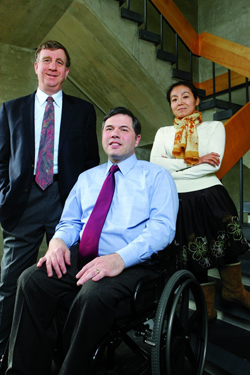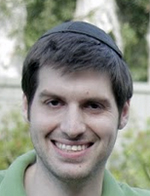By Jacob Kamaras/JNS.org

 BOSTON–The Ruderman Family Foundation on Monday, Jan. 27, announced that Dr. Michael Ashley Stein, a visiting professor at Harvard Law School and an internationally recognized expert on disability rights, will receive the inaugural $100,000 Morton E. Ruderman Award in Inclusion.
BOSTON–The Ruderman Family Foundation on Monday, Jan. 27, announced that Dr. Michael Ashley Stein, a visiting professor at Harvard Law School and an internationally recognized expert on disability rights, will receive the inaugural $100,000 Morton E. Ruderman Award in Inclusion.
Stein is the co-founder and executive director of the Harvard Law School Project on Disability (HPOD), whose central mission is to support the implementation of the United Nations Convention on the Rights of Persons with Disabilities (CRPD), a human rights treaty adopted by the U.N. in December 2006 which mandates that people with disabilities enjoy the same rights as all other people. Stein participated in the drafting of CRPD, which became binding international law in May 2008, and actively consults with governments around the world on their disability laws and policies.
“HPOD initially began as an outgrowth of my participation in the CRPD negotiations and the very apparent realization that achieving a human rights treaty was a great victory, but that the real work really would begin afterwards in implementing that treaty at individual country levels,” Stein told JNS.org.
“We’ve worked in some 40 countries, and each one raises its own challenges and rewards. The same [holds true] for high-profile litigation. I personally enjoy most working with person with intellectual disabilities on claiming their rights and find the most rewarding when parents tell me their children with disabilities are now in school and flourishing.”
The Ruderman Family Foundation, an organization based in Israel and Boston that prioritizes the inclusion of people with disabilities in the Jewish community, said the new award—named after Mort Ruderman, a founder of the foundation and the father of its current president—“recognizes an individual who has made an extraordinary contribution to the inclusion of people with disabilities in the Jewish world and the greater public.” The primary consideration for the award is whether the recipient’s work has made life more equitable for people with disabilities, according to the foundation.
“Our foundation decided to establish an award in my father’s name to remember his values and work which has touched so many lives,” Jay Ruderman, president of the Ruderman Family Foundation, said in a statement. “Those who knew my father agree that what drove his interest in disability inclusion was a bedrock commitment to fairness: he fervently believed that people with disabilities were not getting a fair shake in the Jewish community or in society at large. It was his belief that everyone deserves to be treated fairly that has inspired our mission to work toward the full inclusion of people with disabilities in our community.”
Stein, who has served as president of the National Disabled Bar Association, told JNS.org that the $100,000 award’s establishment “raises the profile of work on disability inclusion, and in particular its importance within the Jewish world.”
Asked if he believes disability law receives the attention it deserves within the American legal community, Stein said it has “proven a popular topic among academics and law students, but it has not yet claimed its equal standing with other civil rights among the public.”
“This is likely because we’re at the tail end of populations whose rights have been recognized, and there is still a huge amount of stereotyping that needs to be combatted,” Stein said.
When its disability-rights landscape is compared to the situation in other countries around the world, the U.S. is “extremely strong on civil rights, even when not always implemented,” said Stein. While America “has seen dramatic improvements in people with disabilities accessing the built environment, like buses and shopping centers,” Stein believes the country has “failed radically at improving the employment prospects for the disability sector.”
Israel, meanwhile, “has very strong [disability] laws, but has been slow in enforcing them,” Stein said. Yet the Jewish state ratified the CRPD before the U.S. did, noted Stein, who hopes that Israel “can now take the lead and demonstrate innovative policies and leadership” in the area of disability rights.
Harvard Law School Professor and Vice Dean William Alford, who co-founded HPOD with Stein in 2004 and is currently the project’s chair, said in a statement that Stein’s “blend of wisdom, humanity, determination, and wit is without parallel.”
“It is absolutely inspiring to see him in action—bringing his immense God-given talents to bear as he works tirelessly, with brilliance, compassion and humility, to improve the lives of others and to make the world better for all of us,” Alford said.
*
Kamaras is editor of JNS.org